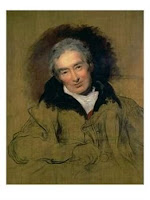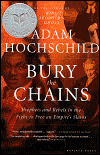 This is a follow-up to Cara’s post the other day about the movie Amazing Grace. Why, you may ask, did the movie industry glom onto what is still (and unjustly) a rather obscure bit of history? Because this year is the two-hundredth anniversary of the Slave Trade Act that came into law on March 25, 1807 (and we’re nearly there and it’s my turn to blog). This, by the way is Sir Thomas Lawrence’s portrait of William Wilberforce.
This is a follow-up to Cara’s post the other day about the movie Amazing Grace. Why, you may ask, did the movie industry glom onto what is still (and unjustly) a rather obscure bit of history? Because this year is the two-hundredth anniversary of the Slave Trade Act that came into law on March 25, 1807 (and we’re nearly there and it’s my turn to blog). This, by the way is Sir Thomas Lawrence’s portrait of William Wilberforce.
 I first became interested in this topic by reading Adam Hochschild’s wonderful book Bury The Chains, which made me aware of what a burning issue abolition was for late Georgian society (and inspired me to write my October 2007 release, Forbidden Shores). Hochschild points out that it was possibly the first time that people cared passionately enough about a cause–something that would benefit strangers thousands of miles away who they would never meet–to make sacrifices themselves. Ropemakers in Bristol, one of the cities that thrived on the trade, petitioned to end the slave trade, knowing full well that their own livelihood would be threatened.
I first became interested in this topic by reading Adam Hochschild’s wonderful book Bury The Chains, which made me aware of what a burning issue abolition was for late Georgian society (and inspired me to write my October 2007 release, Forbidden Shores). Hochschild points out that it was possibly the first time that people cared passionately enough about a cause–something that would benefit strangers thousands of miles away who they would never meet–to make sacrifices themselves. Ropemakers in Bristol, one of the cities that thrived on the trade, petitioned to end the slave trade, knowing full well that their own livelihood would be threatened.
 It was also a movement that cut through divisions of class and gender; ordinary housewives boycotted sugar. Wedgwood produced this plaque (it reads Am I not a man and a brother?) that appeared on many artefacts.
It was also a movement that cut through divisions of class and gender; ordinary housewives boycotted sugar. Wedgwood produced this plaque (it reads Am I not a man and a brother?) that appeared on many artefacts.
The abolitionists introduced the tactics of the modern political campaign–slogans, investigative journalism, slogans, and powerful visuals like this depiction of a slave ship.
 Of course, the major question is why did this happen? What made ordinary–and not so ordinary people–care so passionately about this cause? Hochschild’s answer is rather interesting, and one that made me think entirely differently about the Gerogian and Regency periods. Georgian England was seen, and saw itself, surprisingly, as a fairminded and democratic sort of place–the monarchy was mostly benign, and the concept of Magna Carta operated as a sort of unofficial constitution. Few could vote, but ordinary men had the power of the petition. The country had a great infrastructure, because of the Royal Mail, a high level of literacy, and dozens of newspapers. The dealbreaker of the 1807 act was a new petition bearing several thousand signatures, collected in the north of England and delivered to Westminster in a matter of hours. Hochschild suggests, too, that people in England felt an affinity with the Africans whose communities were devastated by slaver raids, because something similar happened in their own ports–the press gang, which enforced men to serve in the Navy.
Of course, the major question is why did this happen? What made ordinary–and not so ordinary people–care so passionately about this cause? Hochschild’s answer is rather interesting, and one that made me think entirely differently about the Gerogian and Regency periods. Georgian England was seen, and saw itself, surprisingly, as a fairminded and democratic sort of place–the monarchy was mostly benign, and the concept of Magna Carta operated as a sort of unofficial constitution. Few could vote, but ordinary men had the power of the petition. The country had a great infrastructure, because of the Royal Mail, a high level of literacy, and dozens of newspapers. The dealbreaker of the 1807 act was a new petition bearing several thousand signatures, collected in the north of England and delivered to Westminster in a matter of hours. Hochschild suggests, too, that people in England felt an affinity with the Africans whose communities were devastated by slaver raids, because something similar happened in their own ports–the press gang, which enforced men to serve in the Navy.
As I said, Hochschild’s book made me rethink the Regency, and I’m wondering if you have come across something, a book or movie, that revealed an unusual facet or layer to your understanding of the period.
